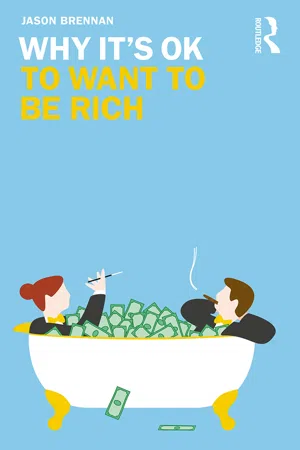
- 10 pages
- English
- ePUB (mobile friendly)
- Available on iOS & Android
Why It's OK to Want to Be Rich
About this book
Finger-wagging moralizers say the love of money is the root of all evil. They assume that making a lot of money requires exploiting others, and that the best way to wash off the resulting stain is to give a lot of it away.
In Why It's OK to Want to Be Rich, Jason Brennan shows that the moralizers have it backwards. He argues that, in general, the more money you make, the more you already do for others, and that even an average wage earner is productively "giving back" to society just by doing her job. In addition, wealth liberates us to have the best chance of leading a life that's authentically our own.
Brennan also demonstrates how money-based societies create nicer, more trustworthy, and more cooperative citizens. And in another chapter that takes on the new historians of capitalism, Brennan argues that wealthy nations became wealthy because of their healthy institutions, not from their horrific histories of slavery or colonialism.
While writing that the more money one has, the more one should help others, Brennan also notes that we weren't born into a perpetual debt to society. It's OK to get rich and it's OK to enjoy being rich, too.
---
Key Features
- Shows how the desire to become wealthy in an open and fair market helps maximize cooperation and lessens the chance of violence and war
- Argues that it is much easier for the average for-profit business to add value to the world than it is for the average non-profit
- Demonstrates that the kinds of virtues (e.g., conscientiousness, thoughtfulness, hard work) that lead to desirable personal and civic states (e.g., happy marriages, stable families, engaged citizens) also make people richer
- Argues that living in small clans for most of their history has given humans a negative attitude towards anyone acquiring more than her "fair share," an attitude that's ill-suited for our market-driven, globally connected world
- In a final, provocative chapter, maintains that ideal economic growth is infinite.
Frequently asked questions
- Essential is ideal for learners and professionals who enjoy exploring a wide range of subjects. Access the Essential Library with 800,000+ trusted titles and best-sellers across business, personal growth, and the humanities. Includes unlimited reading time and Standard Read Aloud voice.
- Complete: Perfect for advanced learners and researchers needing full, unrestricted access. Unlock 1.4M+ books across hundreds of subjects, including academic and specialized titles. The Complete Plan also includes advanced features like Premium Read Aloud and Research Assistant.
Please note we cannot support devices running on iOS 13 and Android 7 or earlier. Learn more about using the app.
Information
Index
Table of contents
- Cover
- Half Title
- Series
- Title
- Copyright
- Contents
- The root of all evils One
- For the love of money Two
- Is money dirty? Does money corrupt? Three
- It’s ok to make money Four
- Rich country, poor country Five
- Give it away now? Six
- Riches, repugnance, and remaining doubts Seven
- Notes
- Bibliography
- Index